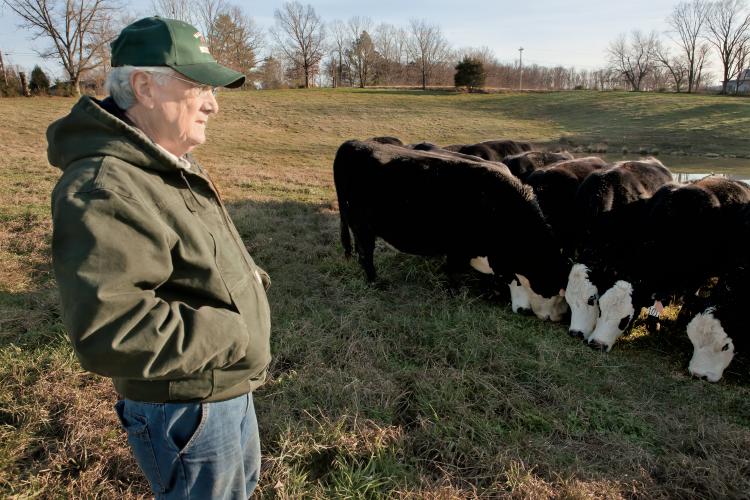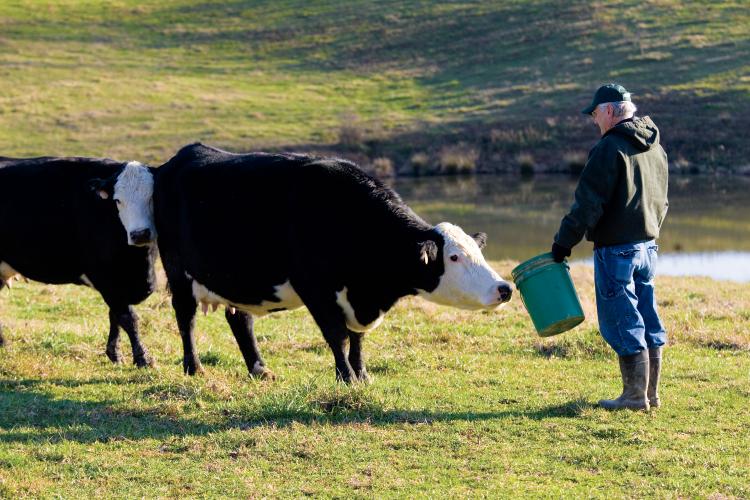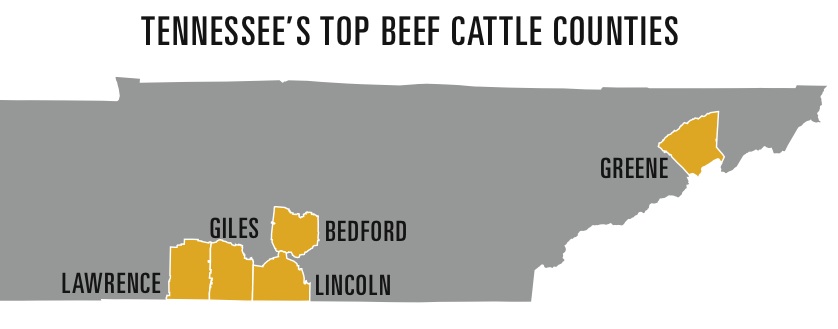Home > Tennessee > Tennessee Crops & Livestock > Beef Cattle Ranks First in Tennessee Agriculture
Beef Cattle Ranks First in Tennessee Agriculture
In partnership with: Tennessee Department of Agriculture

Tennessee cattle producer Mel Maxwell knows the value of working together with other producers.
“One of the strong traits of farmers is we’re independent folks, but we’ve laid that aside, and we’ve banded together, establishing rules, so several small producers like myself can put together a nice truckload of cattle,” says Maxwell of Cookeville, Tennessee.
Those truckloads of look-alike cattle mean bigger profits for producers and make cattle production big business in the state.
Maxwell, who used to travel the 100 miles from Knoxville to Cookeville every weekend to help his father with the family operation, eventually decided he loved raising cattle more than any other job. He’s now a retired farmer, but still helps with the cattle operation and serves as president-elect of the Tennessee Cattlemen’s Association.

An Alliance Formed
Back in 2004, Maxwell was one of the charter members of the Tennessee Beef Alliance, a group of forward-thinking farmers who realized if they produced similar cattle, they could attract more buyers for their beef. They call it the Process Verified Program.
“We put together some bylaws, some rules that we all had to follow and published those,” Maxwell says. “We started with the basics of genetics – only certain bulls could be used – Angus, Hereford and Charolais – in the beginning. We were trying to get uniformity to make all the cattle in a load cookie-cutter same – same size, same color, same sex. By putting together a truckload, it allowed a small producer to leverage himself so he could act like a big producer.”
And get prices a bigger producer could command. The concept was to get a better price for cattle grouped together in a load than if three or four calves were sold alone and the buyer had to put a load together.
“I can say I definitely feel like I get the most value for my calves possible,” Maxwell says. “We get a better price because we band together.”
The rules include when and how often a calf should be vaccinated, when it can be weaned from its mother and started on feed, and what weight it should be sent to market.
“That’s why buyers like our calves so much,” Maxwell says. “We’ll have 50 or 60 bidding on them by phone, Internet, at the auction. When we started, we went to the feedlots – 15 or more – and got them to tell us what kind of calves they wanted. We got input from our customers.”
The Alliance has transformed the state’s beef industry.
“We are a fairly big cattle state – not as big as Texas – but our cow-calf industry is the No. 1 business for the state,” says Jim Neel, University of Tennessee professor of animal science and beef cattle specialist.
Greener Pastures
Tennessee’s affinity for cattle comes from the environment and a new Process Verified Program that helps farmers get more money for their cattle by adding value.
“We don’t have a harsh climate, and of the 5 million acres in agricultural land, 3.5 of that is in forage,” Neel says. “Our terrain is rolling and subject to erosion, which makes it perfect to keep in grass. Most of our cattle are grass fed.”
More than 1 million cows, produced by 45,000 cattle farmers, are raised on that grass.
Most of the state’s 77,000 farmers are classified as small. “Our average herd size is 23 to 24 head of cattle,” says Charles Hord, executive vice president of the Tennessee Cattlemen’s Association.
“Tennessee used to raise a lot of tobacco,” Hord says. “When we got the tobacco settlement money, we used it in our Tennessee Ag Enhancement Program to help farmers find something else to grow. Most of them turned to cattle.”
Namely, beef cattle.
“Years ago, in the ’40s and ’50s, we had a lot of dairies,” Neel says. “After World War II, veterans came home and saw they couldn’t have the income they needed from dairy cattle and switched to beef cattle. Families went to town to get jobs but maintained their cattle herd. That’s how we ended up with so many small farms – they kept a cow-calf operation and another job off the farm.”
Livestock accounts for half of all total agriculture income, says Neel, adding that the dollars spent in livestock gives the state a multiplier effect. In 2010, cattle and calves ranked No. 1 in the state over beans and broilers with $545 million in receipts for cow-calf operations.
“For every dollar made in livestock, it turns over 2.5 to 3 times,” he says. “Beef cattle is big business.”
One of the other ways that beef is marketed is direct to consumers. Neola Farms near Memphis raises Black Angus cattle and sells the meat through its local farmers market and direct from the farm to consumers and restaurants.
Indeed, Tennessee ranks fourth in the nation behind Texas, Oklahoma and Missouri for number of cow-calf producers.
“We still have a long ways to go with getting producers to buy into the Process Verified Program,” Neel says. “It hasn’t been easy. We had a lot of resistance early on getting people to understand marketing, but we’re making headway.”
Hord agrees. “I am optimistic for the future of cattle in Tennessee,” he says. “Given our geography and our grass, we can add extra weight to cattle cheaply. We are well positioned. We have a lot of land and a lot of people who enjoy raising cattle. A new generation is stepping up and may be better at responding to what the consumer wants.”





how many head of cattle are in the top 10 beef herds in TN?